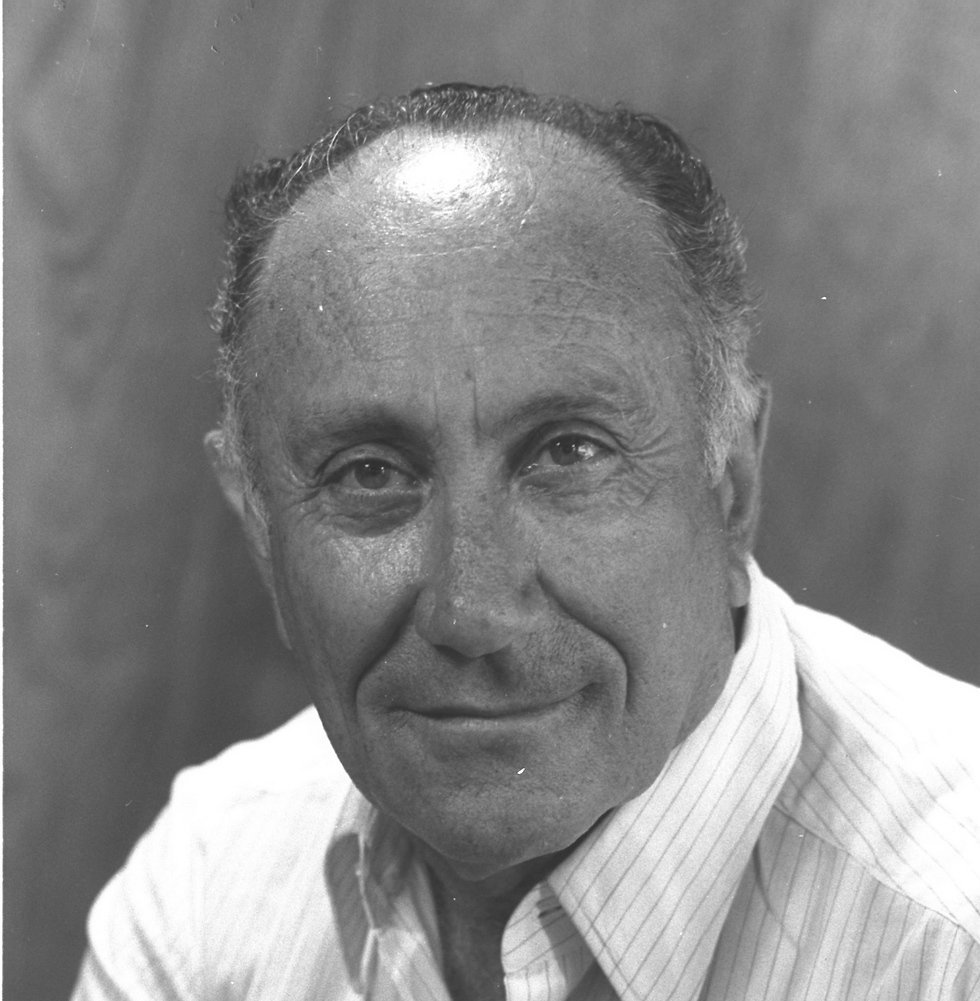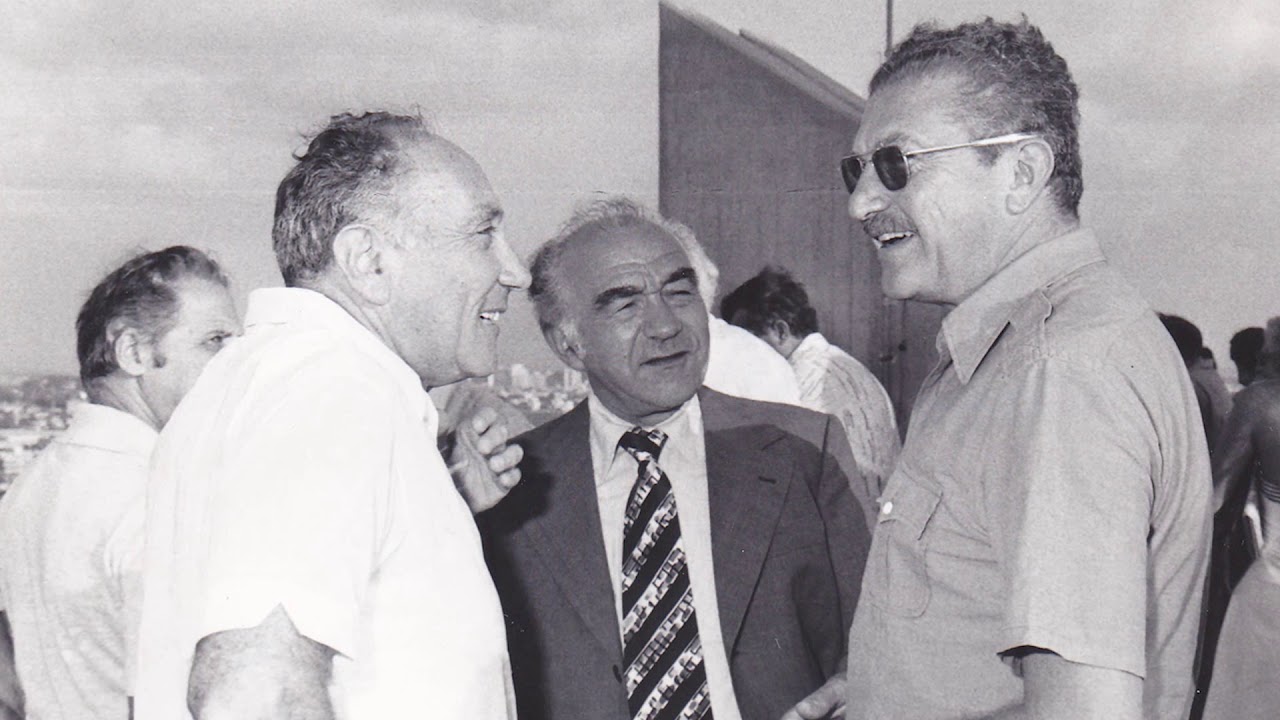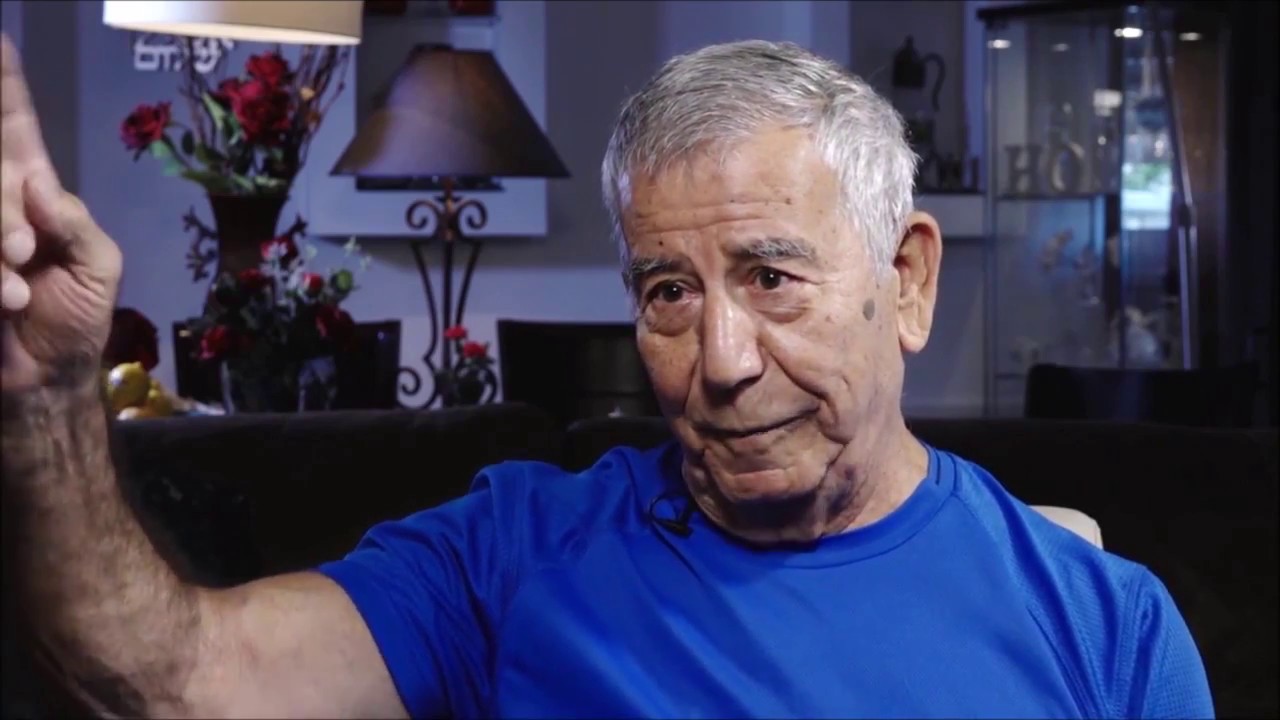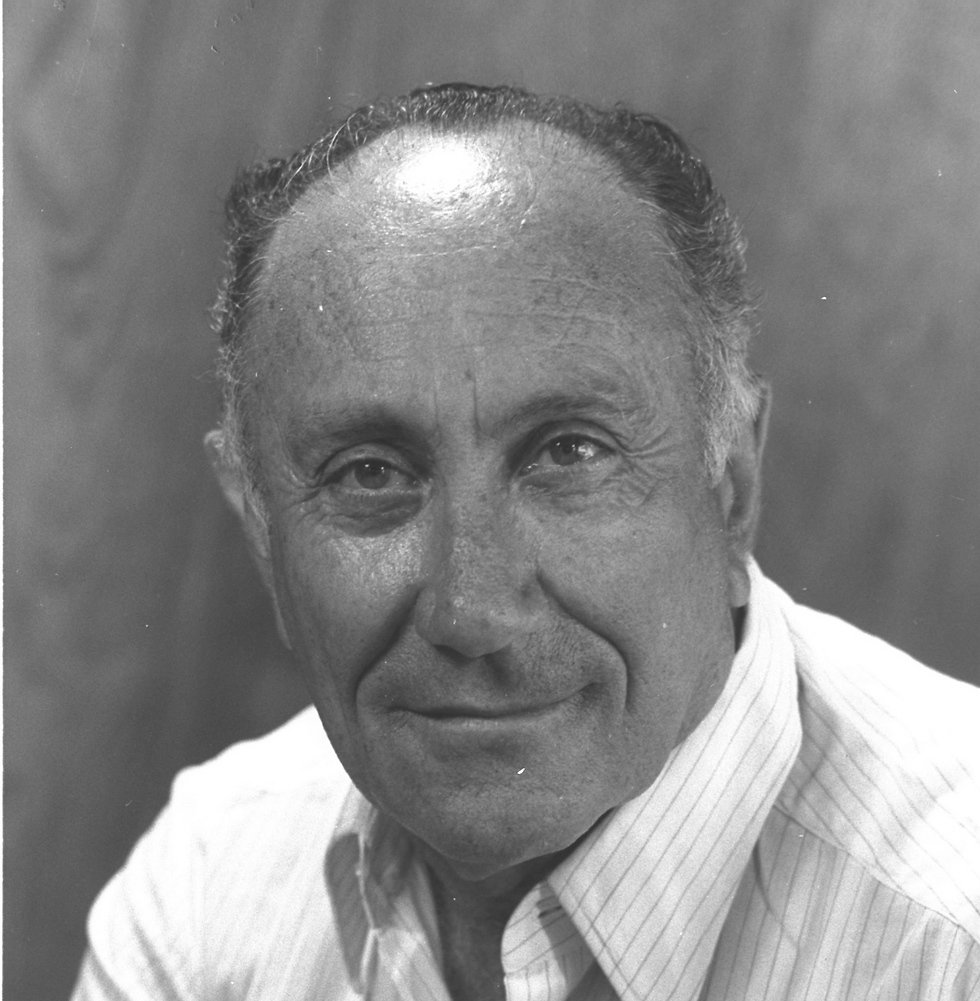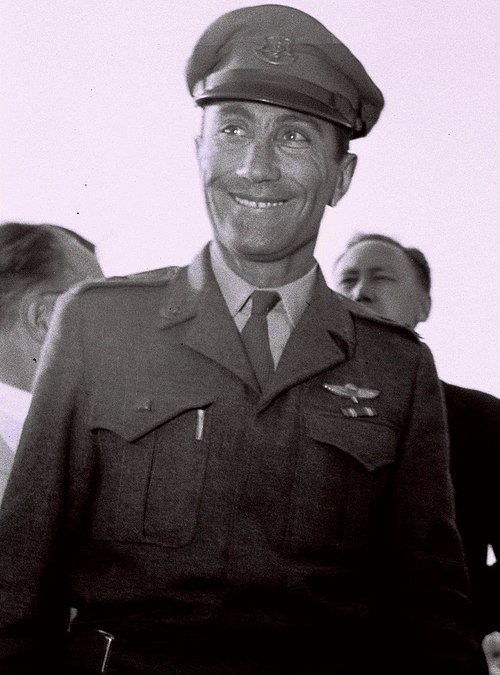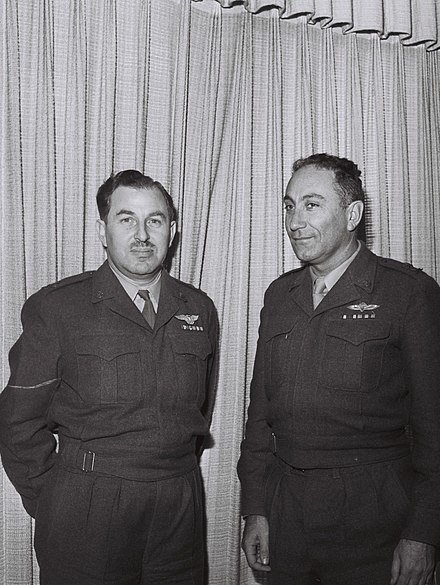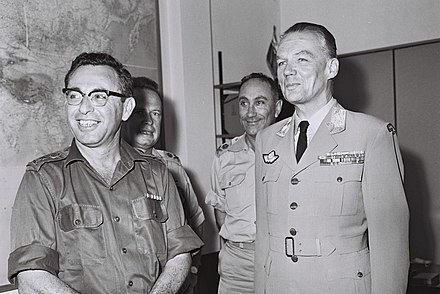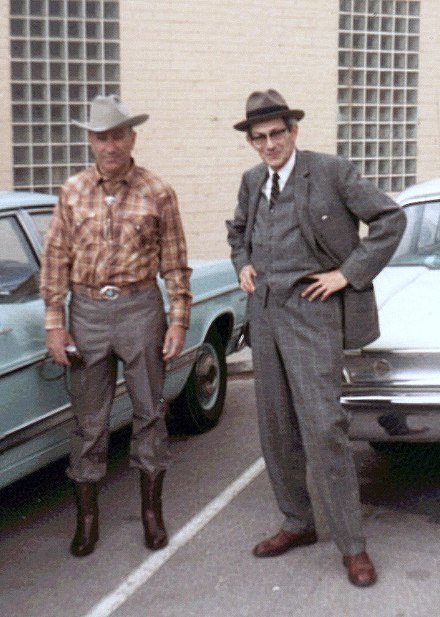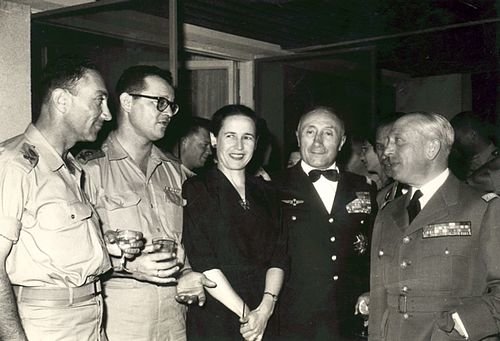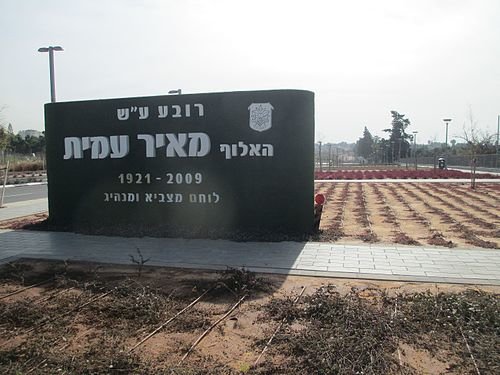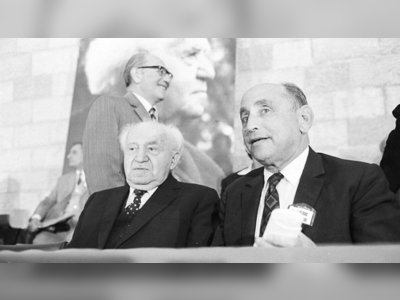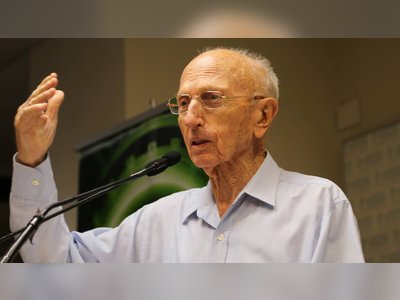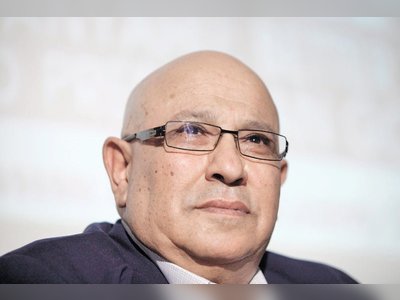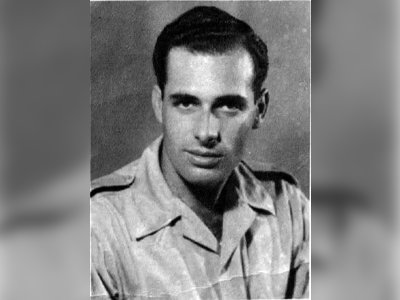מורשת גדולי האומה
בזכותם קיים
beta
Meir Amit: A Life of Service and Leadership
Meir Amit (born Meir Slutsky) was a prominent figure in Israel's history, known for his distinguished military career, political leadership, and contributions to the Israeli intelligence community. He was born on March 17, 1921, in Tiberias, British Mandate Palestine, to parents who had immigrated from Chernigov, Ukraine, in 1920 during the early days of the Soviet Socialist Republic.
Early Life
During his childhood, Meir Amit's family relocated first to Jerusalem and later to Ramat Gan. His parents were active members of their local community, serving on committees and contributing to their neighborhood's development. Meir Amit attended various schools in the region, including the Boruchov Elementary School in Givatayim, the Givat Hashelosha Regional School, and a high school in Tel Aviv.
In 1939, after completing his studies, Meir Amit joined Kibbutz Alumim and remained a member until 1952.
Military Service
Meir Amit's military journey began in 1936 when he joined the "Haganah" organization during his high school years. In 1940, shortly after completing his studies, he volunteered for the "Notrim" forces and served until 1945. During his military service, he underwent special training courses, including one in 1942 in Ramat Yochanan and another in 1944 in Geura.
His leadership skills quickly became evident as he rose through the ranks. In 1947, he became the commander of a regional company in the "Dror" Battalion (Battalion 14) of the Givati Brigade. During the War of Independence, he fought in battles in the Emek and Jezreel Valleys, contributing to the liberation of the Lower Galilee. He sustained injuries during the battle for Jenin. In the emergency operation, he served as the deputy commander of Battalion 15 of the Givati Brigade and later became the commander of the fortified Battalion 19 in Yavné. His battalion played a crucial role in Operation Horev, and its fighters were among the first Givati Brigade troops to reach Eilat during Operation Ovda.
After the war, Meir Amit continued to serve in the IDF. In 1950, he was appointed deputy commander of the Givati Brigade and, a few months later, assumed command of the brigade, a position he held during the Battle of Tel Motilla. In 1951, he was appointed head of the IDF Training Directorate, and in 1952, he became the head of the Operations Department in the IDF General Staff. He furthered his education in the United Kingdom, and in February 1955, he was appointed as the Chief of the General Staff's Chief of Staff. In November 1955, he became the commander of the Southern Command, and in August 1956, he was promoted to the rank of Major General. He then returned to his role as the Chief of Staff, where he planned and executed Operation Kadesh in the same year. Meir Amit also served as the commander of the Central Command from 1958 to 1959. During a parachute jump, he suffered a severe injury and was hospitalized for over a year. He later pursued studies at Columbia University in the United States and was appointed the head of Military Intelligence (AMAN) in early 1962.
On March 26, 1963, Meir Amit was appointed as the head of the Intelligence and Special Operations Directorate, following the retirement of Isser Harel. For about nine months, he concurrently served as the head of both AMAN and "the Institute." He continued as the head of "the Institute" until 1968. During his tenure, he transferred Unit 188, the operational intelligence unit of the Intelligence Corps, commanded by Lt. Col. Yosef Yariv, to the Institute, where it merged with "Sayeret Matkal," the special operations unit, forming "Unit Kesariah." Additionally, Meir Amit, in his capacity as the head of AMAN and "the Institute," supported the intelligence activities of the IDF's General Staff Reconnaissance Unit (Sayeret Matkal).
During his term as head of the Institute, in 1965, Meir Amit ordered the elimination of the Nazi war criminal Herberts Cukurs. In 1966, Operation Diamond, in which Iraqi pilot Munir Redfa defected with a MiG-21 fighter jet and landed in Israel, was conducted.
Despite the achievements during his leadership, there were also some operational failures. Agent Eli Cohen was captured in Damascus and executed, while Wolfgang Lotz, who operated in Egypt, was also arrested. The Ben Barka affair led to a sharp conflict between Meir Amit and Isser Harel, with Harel demanding Meir Amit's resignation due to his involvement in the affair.
Meir Amit established connections with the Kurds in Iraq and visited the region several times. On the eve of the Six-Day War, he visited Washington, D.C., and upon his return, reported that contrary to the estimates of Foreign Minister Abba Eban, the U.S. government would not oppose a preemptive Israeli strike against Egypt. After the Six-Day War, Meir Amit advocated for the release of the "Shame Prisoners," who had been held in Egyptian prisons since 1954, as part of the prisoner exchange negotiations.
Public and Business Career
From 1968 to 1977, Meir Amit served as the CEO of "Koor Industries," the industrial division of the Histadrut, Israel's national labor federation and one of the largest industrial conglomerates in Israel.
In January 1977, Meir Amit left the Labor Party and, along with a group of friends known as the "Amit Group," joined the Democratic Movement for Change (Dash). In the primary elections, he ranked third on Dash's list for the Knesset. He was elected to the Seventh Knesset as a Dash member and served on the Foreign Affairs and Defense Committee. He later held the positions of Minister of Transportation and Minister of Communications in the government of Menachem Begin until September 15, 1978. After Dash disbanded in 1978, Meir Amit joined the Labor Party.
After retiring from the Knesset, Meir Amit ventured into private business. In 1981, he co-founded the "General Society for Escort Services" with Haim Carmel and Jean Friedman, which initiated the "Amos" communication escort project. Meir Amit served as the director of the company and its subsidiary, "Spacecom," established in 1993 in partnership with the aerospace industry and other stakeholders. Between 1982 and 1984, he served as chairman of El Al Israel Airlines. In 1985, he was appointed as a director in the holding company "HaChavra LeYisrael" (The Company for Israel).
From 1989 to 2001, he represented the businessman Sami Shamoon in Israel and served as a director in the Yakhin-Hakal Group, where he also represented Shamoon on the board of directors of Teva Pharmaceutical Industries. In the late 1990s, Meir Amit served as a director in the insurance company "Clal."
He was also involved in various public positions, including serving on the board of the Jaffee Center for Strategic Studies at Tel Aviv University, as a member of the Council for Economic Planning, chairman of the Israel Center for Management (MIL), and president of the Center for Intelligence Heritage.
In 1997, Meir Amit was awarded the title of Honorary Citizen of Ramat Gan, and in 2003, he received the Israel Prize for his "pioneering and diverse activity, significant security contribution, and promotion and development of the Israeli economy and industry."
Personal Life
Meir Amit left behind his wife, Yona (née Kalman), three daughters, including the renowned architect and urban planner Anat Gonen, and grandchildren.
Legacy
Meir Amit's contributions are honored through various street names, including roads named after him in Netanya and Ramat Hasharon. In Ramat Gan, a neighborhood named after him was established in the Kiryat Krinitzi neighborhood. Additionally, the Meir Amit Intelligence and Terrorism Information Center disseminates research and information about terrorist organizations.
Meir Amit's life was marked by his unwavering commitment to the State of Israel, both in military service and public life, making him a significant figure in Israel's history. His leadership, dedication, and accomplishments continue to be remembered and celebrated to this day.
During his childhood, Meir Amit's family relocated first to Jerusalem and later to Ramat Gan. His parents were active members of their local community, serving on committees and contributing to their neighborhood's development. Meir Amit attended various schools in the region, including the Boruchov Elementary School in Givatayim, the Givat Hashelosha Regional School, and a high school in Tel Aviv.
In 1939, after completing his studies, Meir Amit joined Kibbutz Alumim and remained a member until 1952.
Military Service
Meir Amit's military journey began in 1936 when he joined the "Haganah" organization during his high school years. In 1940, shortly after completing his studies, he volunteered for the "Notrim" forces and served until 1945. During his military service, he underwent special training courses, including one in 1942 in Ramat Yochanan and another in 1944 in Geura.
His leadership skills quickly became evident as he rose through the ranks. In 1947, he became the commander of a regional company in the "Dror" Battalion (Battalion 14) of the Givati Brigade. During the War of Independence, he fought in battles in the Emek and Jezreel Valleys, contributing to the liberation of the Lower Galilee. He sustained injuries during the battle for Jenin. In the emergency operation, he served as the deputy commander of Battalion 15 of the Givati Brigade and later became the commander of the fortified Battalion 19 in Yavné. His battalion played a crucial role in Operation Horev, and its fighters were among the first Givati Brigade troops to reach Eilat during Operation Ovda.
After the war, Meir Amit continued to serve in the IDF. In 1950, he was appointed deputy commander of the Givati Brigade and, a few months later, assumed command of the brigade, a position he held during the Battle of Tel Motilla. In 1951, he was appointed head of the IDF Training Directorate, and in 1952, he became the head of the Operations Department in the IDF General Staff. He furthered his education in the United Kingdom, and in February 1955, he was appointed as the Chief of the General Staff's Chief of Staff. In November 1955, he became the commander of the Southern Command, and in August 1956, he was promoted to the rank of Major General. He then returned to his role as the Chief of Staff, where he planned and executed Operation Kadesh in the same year. Meir Amit also served as the commander of the Central Command from 1958 to 1959. During a parachute jump, he suffered a severe injury and was hospitalized for over a year. He later pursued studies at Columbia University in the United States and was appointed the head of Military Intelligence (AMAN) in early 1962.
On March 26, 1963, Meir Amit was appointed as the head of the Intelligence and Special Operations Directorate, following the retirement of Isser Harel. For about nine months, he concurrently served as the head of both AMAN and "the Institute." He continued as the head of "the Institute" until 1968. During his tenure, he transferred Unit 188, the operational intelligence unit of the Intelligence Corps, commanded by Lt. Col. Yosef Yariv, to the Institute, where it merged with "Sayeret Matkal," the special operations unit, forming "Unit Kesariah." Additionally, Meir Amit, in his capacity as the head of AMAN and "the Institute," supported the intelligence activities of the IDF's General Staff Reconnaissance Unit (Sayeret Matkal).
During his term as head of the Institute, in 1965, Meir Amit ordered the elimination of the Nazi war criminal Herberts Cukurs. In 1966, Operation Diamond, in which Iraqi pilot Munir Redfa defected with a MiG-21 fighter jet and landed in Israel, was conducted.
Despite the achievements during his leadership, there were also some operational failures. Agent Eli Cohen was captured in Damascus and executed, while Wolfgang Lotz, who operated in Egypt, was also arrested. The Ben Barka affair led to a sharp conflict between Meir Amit and Isser Harel, with Harel demanding Meir Amit's resignation due to his involvement in the affair.
Meir Amit established connections with the Kurds in Iraq and visited the region several times. On the eve of the Six-Day War, he visited Washington, D.C., and upon his return, reported that contrary to the estimates of Foreign Minister Abba Eban, the U.S. government would not oppose a preemptive Israeli strike against Egypt. After the Six-Day War, Meir Amit advocated for the release of the "Shame Prisoners," who had been held in Egyptian prisons since 1954, as part of the prisoner exchange negotiations.
Public and Business Career
From 1968 to 1977, Meir Amit served as the CEO of "Koor Industries," the industrial division of the Histadrut, Israel's national labor federation and one of the largest industrial conglomerates in Israel.
In January 1977, Meir Amit left the Labor Party and, along with a group of friends known as the "Amit Group," joined the Democratic Movement for Change (Dash). In the primary elections, he ranked third on Dash's list for the Knesset. He was elected to the Seventh Knesset as a Dash member and served on the Foreign Affairs and Defense Committee. He later held the positions of Minister of Transportation and Minister of Communications in the government of Menachem Begin until September 15, 1978. After Dash disbanded in 1978, Meir Amit joined the Labor Party.
After retiring from the Knesset, Meir Amit ventured into private business. In 1981, he co-founded the "General Society for Escort Services" with Haim Carmel and Jean Friedman, which initiated the "Amos" communication escort project. Meir Amit served as the director of the company and its subsidiary, "Spacecom," established in 1993 in partnership with the aerospace industry and other stakeholders. Between 1982 and 1984, he served as chairman of El Al Israel Airlines. In 1985, he was appointed as a director in the holding company "HaChavra LeYisrael" (The Company for Israel).
From 1989 to 2001, he represented the businessman Sami Shamoon in Israel and served as a director in the Yakhin-Hakal Group, where he also represented Shamoon on the board of directors of Teva Pharmaceutical Industries. In the late 1990s, Meir Amit served as a director in the insurance company "Clal."
He was also involved in various public positions, including serving on the board of the Jaffee Center for Strategic Studies at Tel Aviv University, as a member of the Council for Economic Planning, chairman of the Israel Center for Management (MIL), and president of the Center for Intelligence Heritage.
In 1997, Meir Amit was awarded the title of Honorary Citizen of Ramat Gan, and in 2003, he received the Israel Prize for his "pioneering and diverse activity, significant security contribution, and promotion and development of the Israeli economy and industry."
Personal Life
Meir Amit left behind his wife, Yona (née Kalman), three daughters, including the renowned architect and urban planner Anat Gonen, and grandchildren.
Legacy
Meir Amit's contributions are honored through various street names, including roads named after him in Netanya and Ramat Hasharon. In Ramat Gan, a neighborhood named after him was established in the Kiryat Krinitzi neighborhood. Additionally, the Meir Amit Intelligence and Terrorism Information Center disseminates research and information about terrorist organizations.
Meir Amit's life was marked by his unwavering commitment to the State of Israel, both in military service and public life, making him a significant figure in Israel's history. His leadership, dedication, and accomplishments continue to be remembered and celebrated to this day.
- מאיר עמית – ויקיפדיהhe.wikipedia.org
